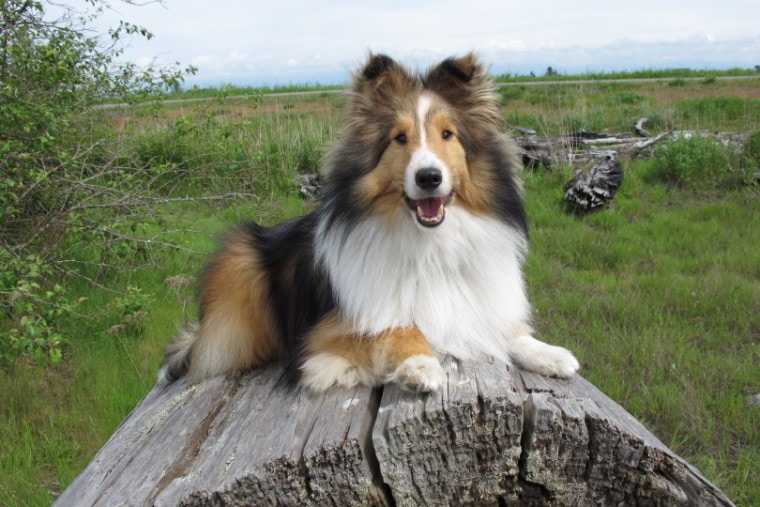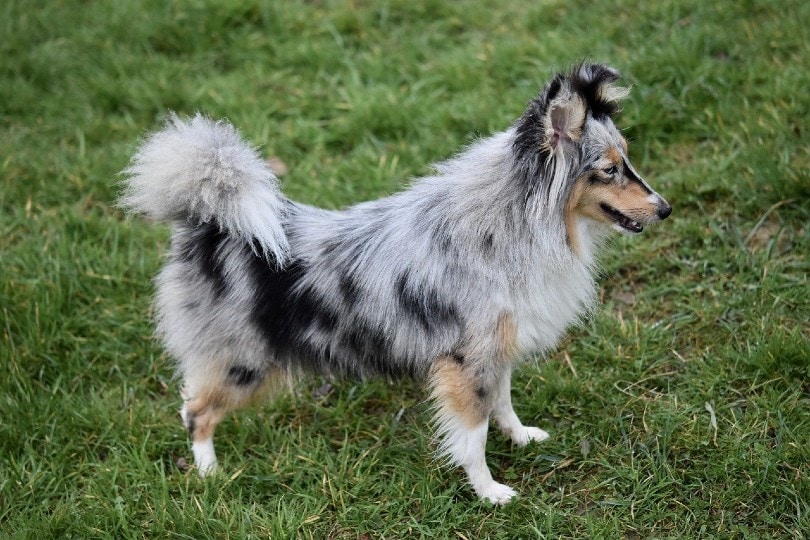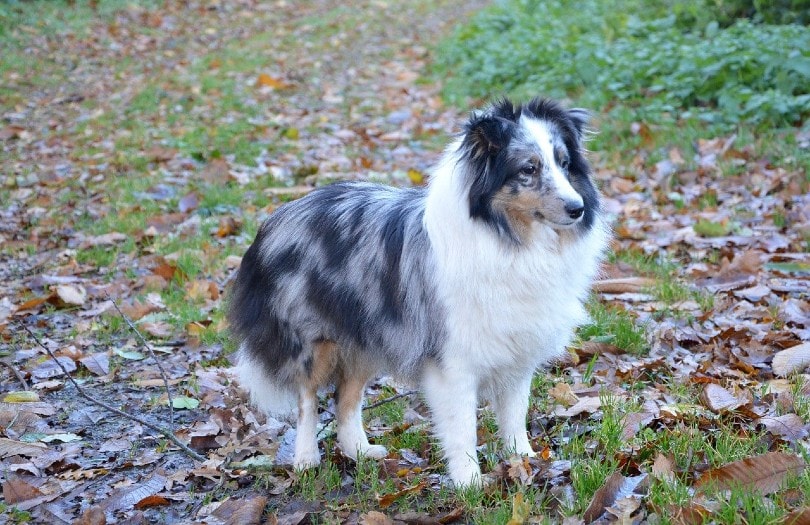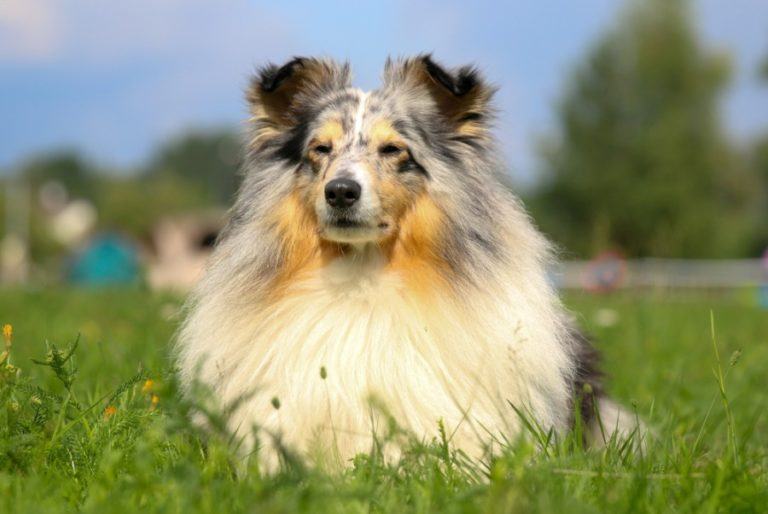
Click Below to Skip Ahead
Shetland Sheepdogs, also affectionately known as Shelties, originated in the remote and harsh Shetland Islands off the coast of Scotland. They closely resemble their larger cousin, the Border Collie, and indeed, they are equally adept at herding and just as intelligent. They are smaller than Collies, though, and don’t need as much exercise, making them an easier-to-care-for option.
Breed Overview
Height:
13 – 16 inches
Weight:
11 – 24 pounds
Lifespan:
12 – 15 years
Colors:
Sable, black, blue merle, white, tan
Suitable for:
Active families and singles
Temperament:
Active, energetic, friendly, affectionate, protective, intelligent
With their herding heritage, these dogs are highly energetic and do best when given a job to do. They are great family pooches, though, and with their alert and protective nature, they make excellent watchdogs too. The Shetland Sheepdog is an energetic, vibrant, and affectionate pooch and is a great addition to active households. Read on for more information about the intelligent and loving Sheltie!
Shetland Sheepdog Characteristics
Shetland Sheepdog Puppies

Shetland Sheepdogs may not be as energetic as their Collie cousins, but they are still active dogs that need regular exercise. They are smaller than Collies and can thus live happily in apartments or homes with small yards, provided that they get plenty of daily activity. This is an important factor to consider before buying a Shetland Sheepdog, as you’ll need to devote 2–3 hours per day to training and exercise.
Shetland Sheepdogs are generally healthy and will need regular brushing to maintain their coats soft and healthy. Keep reading the Shetland Sheepdog’s full care guide to learn what type of food, exercise, and grooming they need to grow into happy and healthy dogs.
Temperament & Intelligence of the Shetland Sheepdog
Shetland Sheepdogs can be characterized by their high energy, obedience, and intelligence. These dogs were bred to work, and although they are most commonly kept as family pets rather than working dogs today, they still need a ton of mental and physical stimulation. They are generally easy to train for experienced dog owners and may be slightly challenging for novices, but once they are trained properly, they are one of the most obedient dogs in the world. Like their close cousins, the Border Collie, Shelties are also highly intelligent and can be trained to obey a high number of commands. They can watch flocks of sheep without any commands or interference from their owners.
They are also highly loyal dogs that can be protective of their family and somewhat reserved around strangers. They make great watchdogs because they’ll alert you to every strange sound or visitor, but this can also get out of hand without the right training or socialization. These dogs are devoted and highly affectionate with their family and love to be around their owners as much as possible, so they cannot be left at home alone for long periods. An unhappy Sheltie will resort to excessive barking, digging, and destructive behavior to get your attention.

Are These Dogs Good for Families? 👪
Shetland Sheepdogs are wonderful family pets. They are loyal, affectionate, and protective dogs that are great with children and are happy to spend hours playing in the backyard. Of course, they are highly energetic and can easily get excited, so it’s important to keep a close eye on them around young children, as they can easily knock them over.
Does This Breed Get Along With Other Pets?
With proper socialization, Shetland Sheepdogs generally get along great with other dogs. They are not aggressive or overly dominant in any way and enjoy being a part of a pack. They are herding dogs by nature, so they may attempt to herd smaller dogs at times — all in the name of fun, though! Shelties don’t have strong prey drives, so cats and other small pets are usually fine besides the odd herding attempt — with proper socialization, of course.
Things to Know When Owning a Shetland Sheepdog
Food & Diet Requirements 🦴
Shetland Sheepdogs are energetic pooches that need a diet high in quality calories. Dry food is fine as long as it is free from fillers and artificial ingredients. They’ll need 1–2 cups per day split into two meals, depending on their age and activity levels. They’ll appreciate canned food or lean meats occasionally too, though, and these are great energy boosts for these active dogs.
It’s important to carefully read the ingredient list on the food that you choose and to make sure that an animal-based protein is the first listed ingredient. This can be chicken, beef, or turkey. No matter the protein source, it should make up the bulk of the volume of the food, which is indicated by its place in the ingredient list. Try to avoid foods with too many filler ingredients, like soy or corn, or any artificial colors, flavors, and preservatives. The food should ideally be formulated especially for medium-sized dogs, and be 100% complete and balanced. Lastly, make sure your Sheltie has constant access to fresh, clean water.
Exercise 🐕
Shetland Sheepdogs are highly active pooches. Although they are small and as such, can be kept in apartments or homes with small yards, they need to get out for exercise every day, preferably twice a day. We recommend at least 1–2 hours of intensive exercise every day, but they’ll likely appreciate even more.
Since Shelties are such intelligent pooches, you’ll also want to make sure they get plenty of mental stimulation. This can come from challenging interactive games, like flyball, fetch, scent tracking, and agility games, but puzzle toys are great too. Training will also provide plenty of the required mental stimulation, and Shelties will love the process!

Training 🎾
Shetland Sheepdogs are generally easy to train, especially for experienced dog owners. With their high intelligence and eager-to-please nature, they pick up commands quickly and learn faster than most other dog breeds. Remember that early socialization is a key part of good training, as your Sheltie needs to still be able to obey commands in the presence of other people and dogs and not be easily distracted by what’s going on around them. This is important both for training purposes and their safety — if they are running off into the road after a squirrel, they need to obey your command to stop without hesitation.
The essentials of good training are consistency, patience, and a firm but gentle hand, so reward-based methods are best. Although Shelties are gentle dogs in general, you still need to be in charge and let them know — in a gentle, calm manner — that you’re the pack leader; otherwise, they’ll quickly take the position for themselves.
Grooming ✂️
Shetland Sheepdogs have medium-length, thick coats that have adapted to the harsh, cold climate of Scotland. At a minimum, you’ll need to brush your Sheltie once a week, although daily brushing is best to help with shedding and to remove any dead hair. They’ll need extra brushing during shedding season, though, when they “blow out” their coats. Keep a close eye on the hair behind the ears because it’s prone to matting, and keep their inner ears clean and dry to avoid infection too.
Their coats are fairly harsh and tough and tend to repel water, so they’ll rarely need a bath unless they get filthy. You’ll need to trim their nails once a month or so and brush their teeth two or three times a week. It’s a good idea to begin grooming, nail clipping, and dental hygiene from an early age, as this will get your dog accustomed to it and save you time in the future.

Health and Conditions 🏥
Shetland Sheepdogs are long-lived pooches and generally healthy dogs overall. They can, however, suffer from a few of the same health issues as Collies, so it’s important to be aware of what conditions might come up. Of course, buying your Sheltie from a reputable breeder who regularly tests their dogs for hereditary diseases will go a long way toward preventing most health issues.
Male vs. Female
In general, male Shetland Sheepdogs are slightly larger than females and tend to be needier and attention-seeking. Females are known to be somewhat aloof at times, more independent than males, and easier to train overall because they mature earlier. That said, both male and female Shelties are highly affectionate dogs, and these are anecdotal generalizations for the most part.
Most experts recommend spaying females and neutering males, as it reduces the chance of males wandering and stops unwanted pregnancies in females. This will also mitigate most of these small differences. It’s important to remember that dogs are influenced far more by their upbringing, training, and environment than their sex, and a well-trained Sheltie is a wonderful pooch regardless of their sex!
3 Little-Known Facts About the Shetland Sheepdog
1. They were first registered by the AKC in 1911
Shetland Sheepdogs were first registered by the English Kennel Club in 1909 as the Shetland Collie. However, with mounting pressure from Collie breeders who felt the name was too close to Border Collies, the name was soon changed and registered by the AKC as the Shetland Sheepdog in 1911.
2. They are highly intelligent
According to Stanley Coren’s seminal book in dog intelligence, “The Intelligence of Dogs”, the Shetland Sheepdog ranked sixth out of 132 breeds as the most intelligent breed according to obedience and working IQ. These dogs were able to understand a new command in fewer than five repetitions on average and could obey commands at least 95% of the time.
3. They are a popular breed in the U.S.
Due to being fairly isolated on the Shetland islands for quite a while, the Sheltie was slow to gain popularity in the rest of the world. Only during the late 1970s did the popularity of the Sheltie begin to take hold in the U.S., and today, the breed is ranked as the 23rd most popular breed in the United States.
Final Thoughts
The Shetland Sheepdog is an active, energetic, and affectionate pooch that makes a great family dog for active owners. They are smaller than their close Collie cousins and thus, far easier to care for, train, and manage. With the correct amount of exercise, they can happily live in an apartment or small home. They are rarely aggressive and don’t have much of a prey drive, are great with children, and can be easily trained even by novice owners — with dedication and consistency, of course!
The Sheltie is a gorgeous pooch inside and out and will make a great addition to any family, but especially families that enjoy an active lifestyle and have the time to spend with their Sheltie.
See Also:
- Male vs. Female Shetland Sheepdogs (Shelties): What Are the Differences?
- How Big A Sheltie Gets: With Growth & Weight Chart
Featured Image Credit: K E Walker, Shutterstock








